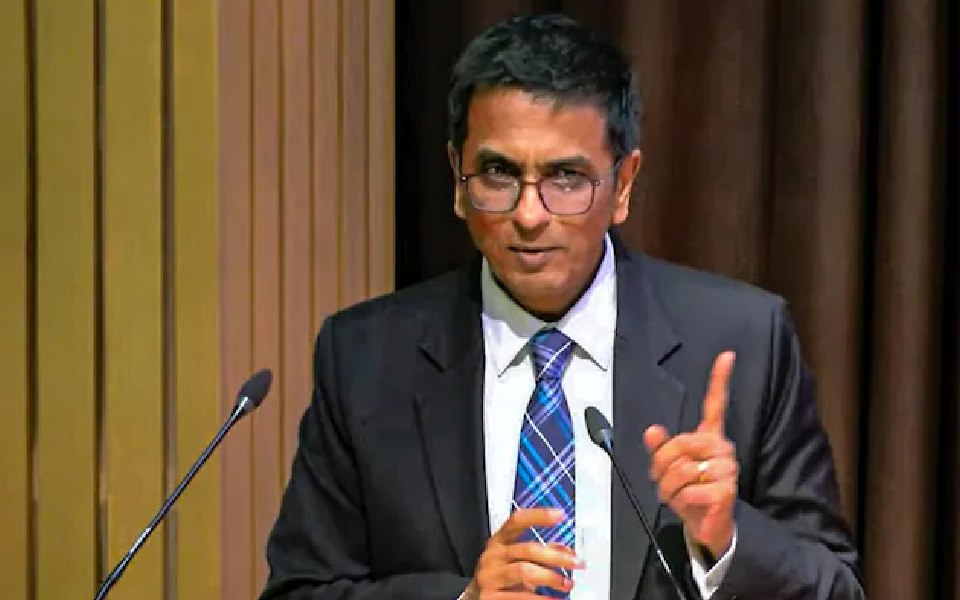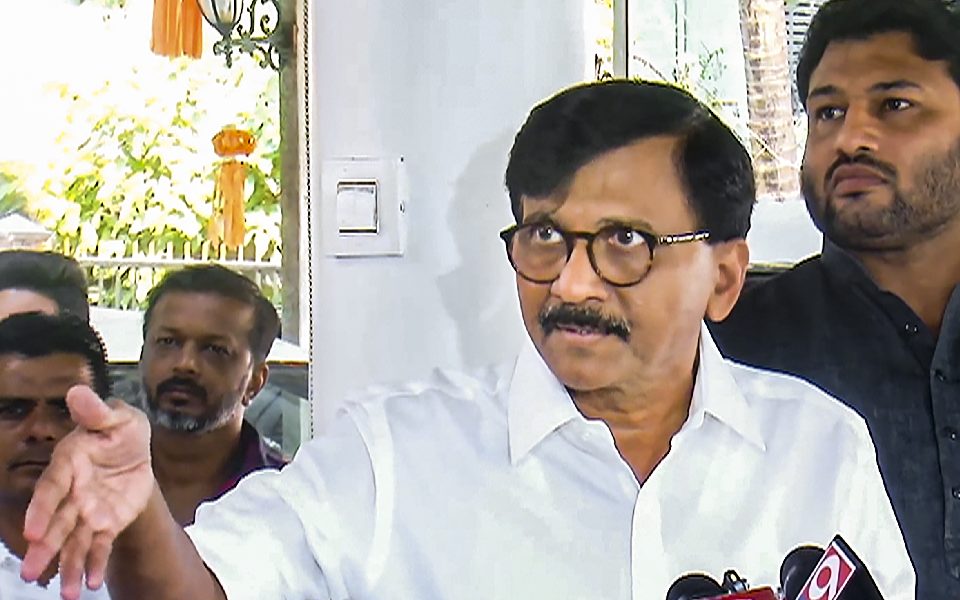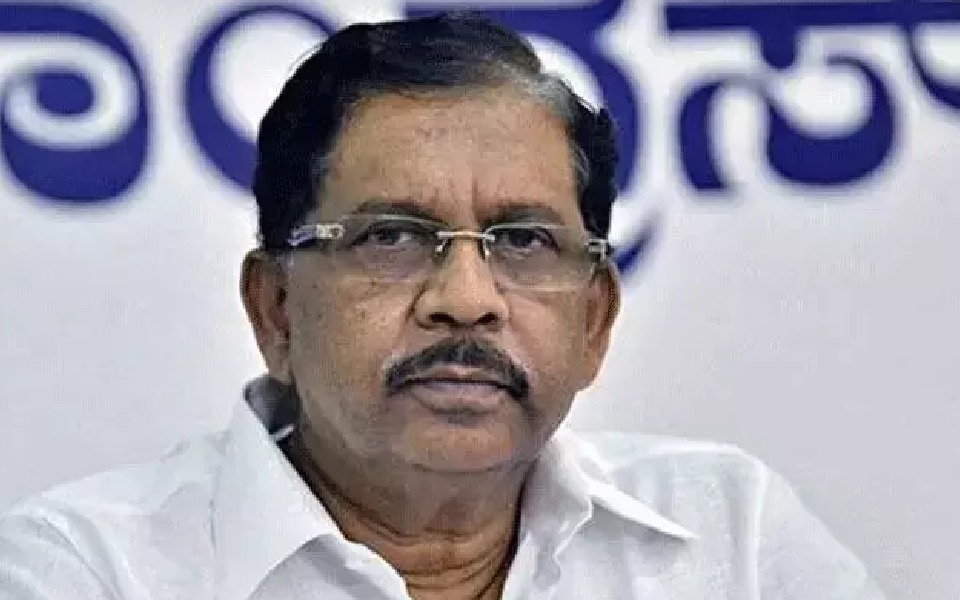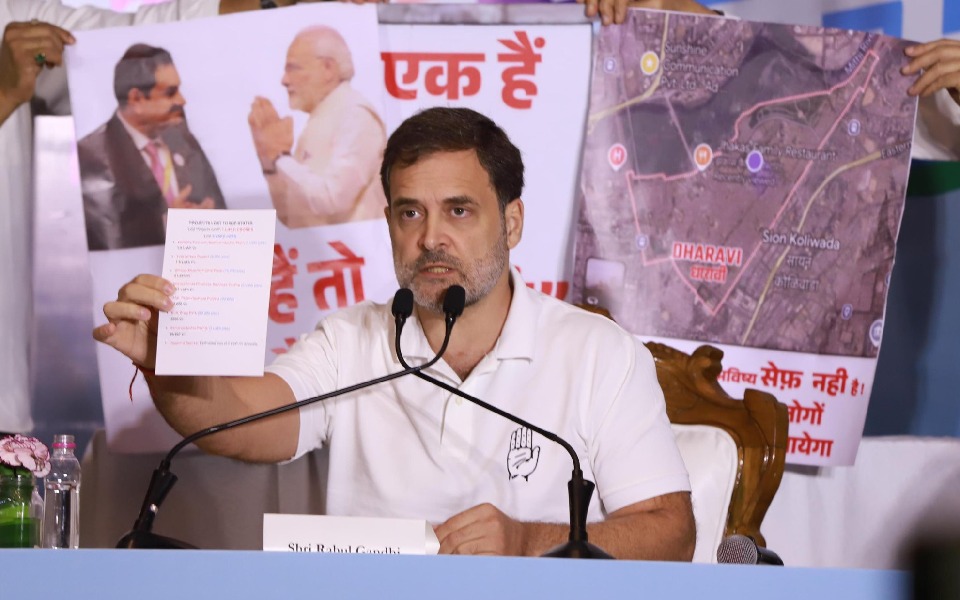New Delhi, Oct 17: Advocating Ayurveda as essential for maintaining holistic health and wellbeing, Chief Justice of India D Y Chandrachud on Thursday said his association with Ayurveda began when he contracted COVID during the pandemic period and relied solely on the traditional system of medical treatment and holistic approaches for recovery.
Addressing the International Conference on Advancements in Research and Global Opportunities for Holistic Ayurveda organised by All India Institute of Ayurveda (AIIA), he said during the second and third waves of the pandemic, when he had contracted COVID he did not take allopathic medicine at all.
"I am a strong advocate of Ayurveda and a holistic lifestyle. My association with AYUSH began during the COVID-19 pandemic, a time when the value of preventive healthcare became more important than ever.
"During the second and third waves of the pandemic when I contracted COVID, I did not take any allopathic medicine at all. Instead, I relied solely on Ayurvedic treatments and holistic approaches, further solidifying my belief in its healing potential," the CJI said.
He said Ayurveda is a traditional system of medicine that emphasises balance in the body, mind and spirit. Detoxification and life optimisation are foundational principles in Ayurveda and essential for achieving long-term health, he said, underlining that in today's fast-paced world, it is also a strategy for managing stress and improving the quality of life.
CJI Chandrachud highlighted four key postulates as a curtain raiser for the conference. Firstly, he said there is a need to discuss if our infrastructure is ready to support Ayurveda's growing demand.
He said the infrastructure at the AIIA is nothing short of impressive. With two campuses and six extension centres, AIIA has successfully served over 2.8 million patients through 44 specialty outpatient departments (OPDs), he said.
The CJI said this achievement not only highlights the scale of AIIA's operations but also highlights its commitment to delivering high-quality care to a diverse population. Moreover, AIIA offers advanced postgraduate and PhD programmes, which are vital in nurturing the next generation of Ayurvedic practitioners and researchers, he added.
"What truly stands out is AIIA's dedication to expanding its reach through its extension centres located in various prestigious sites, including one situated at our Supreme Court. These centres not only provide crucial patient care but also play an essential role in educating the public about the benefits of Ayurveda," Chandrachud said.
By enhancing accessibility and awareness in such influential locations, AIIA helps demystify Ayurvedic practices and promotes a deeper understanding of holistic healthcare among citizens, legal professionals and policymakers alike, he said.
He emphasised that research also plays a pivotal role in strengthening the foundation of Ayurvedic practices. "It allows us to validate and adapt ancient wisdom to meet contemporary health challenges," he said.
The launch of the Ayush Research Portal marks a significant advancement for Ayurvedic research and education, he said, adding that this comprehensive platform houses an impressive collection of over 43,000 research articles, serving as a robust resource for scholars, practitioners and anyone interested in the scientific validation of Ayush principles and practices.
He stressed on ensuring equity and equality in access to Ayurveda. "Equity and equality in healthcare are fundamental principles that ensure every individual has the opportunity to receive the medical attention they deserve," he said.
Recent reports from the National Sample Survey indicate that 95 per cent of rural and 96 per cent urban Indians are now aware of the traditional systems of medicine. This growing awareness not only reflects the increasing demand for Ayush systems but it also highlights the expanding role of Ayurveda in the health and wellness landscape of India, the CJI said.
Access to essential treatments is a fundamental aspect of the right to health, closely aligned with Article 21 of our Constitution, he said.
This commitment to equitable healthcare is further supported by international law, including the International Covenant on Economic, Social and Cultural Rights (ICESCR), which recognises the right to the highest attainable standard of health, he said.
The Article 12 of the ICESCR obligates states to take necessary steps to ensure that everyone can enjoy this right, reinforcing the importance of equitable access to medical care for all individuals, regardless of their geographical location or socioeconomic status, the CJI said.
"Given this context, there is a pressing need for equity in healthcare access across all communities," he said, as he urged all stakeholders to collaborate in creating initiatives that ensure equitable access to Ayurvedic treatment and education.
One of the drawbacks of modern medicine, he highlighted, is the ease with which the drugs are available over the counters and this ease of availability of drugs is one of the serious problems which is confronting our society.
"Because we tend to self medicate on drugs which should be used as last option, not as the first option... Almost every little virus that we contract on the turn of the season is self limiting because the power of the body and mind which nature has given it is so strong.
"Yet in today's time patience is limited and people are becoming less and less tolerant. People are driven to accepting solutions which may work overnight but may damage the body mind in the long run. And that is where I believe that Ayurveda has a great potential to remind people not just to attend to the problems of the moment but to speak of your life and suggest remedies which will have a long lasting benefit to our existence," he said.
Let the Truth be known. If you read VB and like VB, please be a VB Supporter and Help us deliver the Truth to one and all.
Mumbai, Nov 25: Shiv Sena (UBT) MP Sanjay Raut on Monday demanded a re-election in Maharashtra using ballot papers, claiming there were irregularities with the electronic voting machines (EVMs).
Talking to reporters, Raut alleged several complaints about EVMs malfunctioning and questioned the integrity of the recently held elections.
The BJP-led Mahayuti won 230 out of 288 seats in the assembly elections, while the opposition Maha Vikas Aghadi managed 46 seats, with Shiv Sena (UBT) winning just 20 out of 95 seats it contested.
"We have received nearly 450 complaints regarding EVMs. Despite raising objections repeatedly, no action has been taken on these issues. How can we say these elections were conducted fairly? Hence, I demand that the results be set aside and elections be held again using ballot papers," Raut said.
Citing some instances, he said a candidate in Nashik reportedly received only four votes despite having 65 votes from his family, while in Dombivli, discrepancies were found in EVM tallies, and election officials refused to acknowledge the objections.
The Sena (UBT) leader also questioned the credibility of the landslide victories of some candidates, saying, "What revolutionary work have they done to receive more than 1.5 lakh votes? Even leaders who recently switched parties have become MLAs. This raises suspicions. For the first time, a senior leader like Sharad Pawar has expressed doubts about EVMs, which cannot be ignored."
Asked about the MVA's poor performance in the elections, Raut rejected the idea of blaming a single individual.
"We fought as a united MVA. Even a leader like Sharad Pawar, who commands immense respect in Maharashtra, faced defeat. This shows that we need to analyse the reasons behind the failure. One of the reasons is EVM irregularities and the misuse of the system, unconstitutional practices, and even judicial decisions left unresolved by Justice Chandrachud," he said.
Raut stressed that though internal differences might have existed within the MVA, the failure was collective.
He also accused the Mahayuti of conducting the elections in an unfair manner.
"I cannot call the elections fair given the numerous reports of discrepancies in EVMs, mismatched numbers, and vote irregularities across the state," Raut said.





